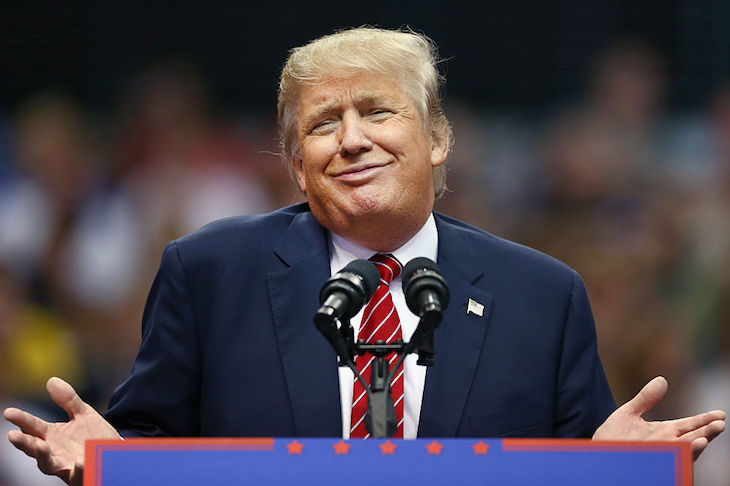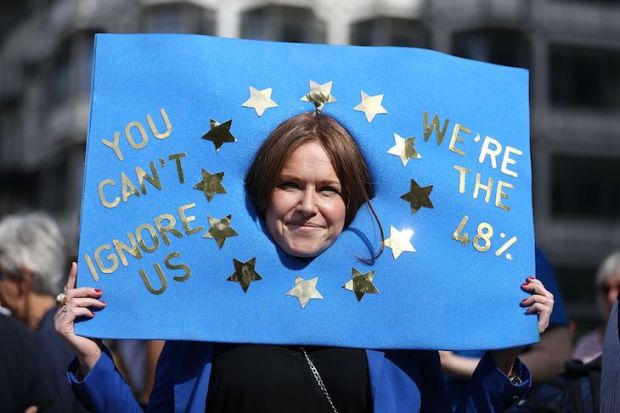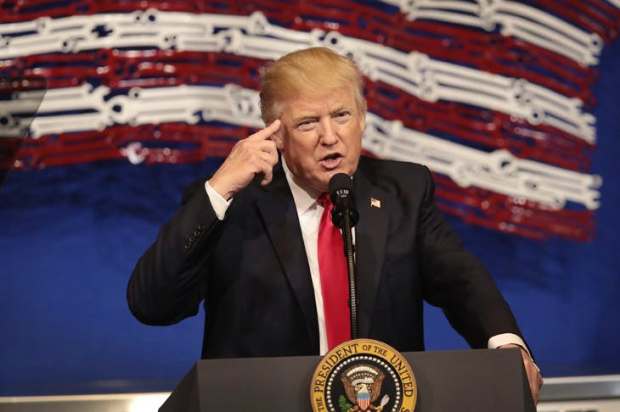How do you defend Donald Trump without coming across like a rabid lunatic? This was my challenge as the only ‘out’ Trumpophile on a panel at the Dublin Festival of Politics last weekend. What made me especially trepidatious is that Ireland is even more painfully right-on than we are these days. It has ditched most of that Roman Catholicism and Cúchulainn and Yeats malarkey and become just another compliant satrapy of the ahistorical, cultureless, communitarian Brussels empire.
Happily there are still one or two Irish who feel just as strongly as I do about what has been done to their wonderful country. There were about a dozen of them in the audience. Some sported red Make America Great Again baseball caps — an act which would probably have got them lynched in more sophisticated parts of town, such as that trendy hotel, the Clarence, that is part- owned by U2.
They were a rag-tag bunch: a genteel couple in their sixties, a young fox-hunting architect, a Northern Irish Catholic with mental health issues, a bearded anarcho-capitalist with the unmistakable ‘Black Irish’ features of a descendant of a shipwrecked Spanish Armada crewman, a brilliant accountant who resembled a farmer and had driven for 90 minutes because ‘you never get to hear views like yours in Ireland’. What they all had in common was this: they were misfits, rebels who felt like strangers in their own country, in a world that has changed almost beyond recognition. Had they been British I dare say they would have voted Leave, for the Trump and Brexit phenomena are, at bottom, the same: the revolt of the masses against the entrenched elite. If you voted Remain, you’ll never ‘get’ Trump. And it’s instructive, I think, that both losing factions have settled on the same ludicrous excuse for losing: that somehow it was the fault of those pesky Russians.
Blaming the Russians is the current geopolitical equivalent of ‘the dog ate my homework’. But the people using it can’t see how silly, implausible and hysterical it is because they are victims of Trump Derangement Syndrome. Trump, like Brexit, has unhinged lots of otherwise perfectly sensible people. One reason, as US commentator Roger Kimball has identified, is their power-ful sense of disbelief that something that was never meant to happen, and couldn’t possibly happen, nonetheless did happen. Another (again, per Kimball, one of the few conservative intellectuals who hasn’t made a fool of himself on this issue) is their ‘embarrassment’ at ‘the utter failure of their fantasies about Donald Trump to materialise’.
This is so true. Never do I cease to be astounded by the jaw-dropping gulf between Trump the monster described by all those expert commentators and Trump the actual president sitting in the Oval Office (a gulf not dissimilar, actually, to the one between Obama, the paragon celebrated in the western media for eight years, and the one who spent his period in the White House gravely, eloquently and handsomely trashing pretty much everything that made American great).
A few weeks ago, for example, one of our most distinguished military historians and former newspaper editors described Trump as a ‘man whose deceits, ignorance and invective are increasingly beyond satire’. He concluded: ‘As for the rest of us — if we can survive Trump without being blown up or driven into a global economic disaster, we shall have cause enough to give thanks.’
Well I’m sorry, but even allowing for the exigencies of a quick turnaround article for a punchy red-top newspaper, this is silly, irresponsible stuff. Trump has already done lots to confound his critics, especially those on the right: booming markets; historically low unemployment; growth at 3 per cent for two quarters; lower taxes; a revitalised military; an energy boom; a canny withdrawal from the iniquitous and pointless Paris climate accord; a bonfire of red tape; the rescue of the US judiciary from capture by left-wing activists; a reset of relations with Saudi Arabia and Israel; a firm stance on North Korea.
You can criticise individual decisions: I’m personally not a fan, for example, of his ongoing meddling in Afghanistan, which suggests to me that he is too much in thrall to the cabal of generals in the White House. But what you can’t fault is his direction of travel. Or even if you hate that direction of travel, what you cannot deny is that unlike any president since at least the days of Reagan, Trump is a man on a mission.
That mission, domestically, is to Make America Great Again. But his ambitions, I believe, are even greater than that. As he outlined in his brilliant Warsaw speech, he sees himself as the defender of not just the free world, but of western civilisation itself.
‘We write symphonies. We pursue innovation. We celebrate our ancient heroes, embrace our timeless traditions and customs, and always seek to explore and discover brand-new frontiers. We reward brilliance. We strive for excellence, and cherish inspiring works of art that honour God. We treasure the rule of law and protect the right to free speech and free expression. We empower women as pillars of our society and of our success. We put faith and family, not government and bureaucracy, at the centre of our lives. And we debate everything. We challenge everything.’
This stuff ought to be so obvious to all of us. But it’s just not, is it? In our relativistic, globalist culture, so many of these values are up for grabs. If you don’t believe they should be (and I certainly don’t) you should get off the fence and back the one world leader unapologetically speaking up for them: Donald Trump.
Got something to add? Join the discussion and comment below.
Get 10 issues for just $10
Subscribe to The Spectator Australia today for the next 10 magazine issues, plus full online access, for just $10.
You might disagree with half of it, but you’ll enjoy reading all of it. Try your first month for free, then just $2 a week for the remainder of your first year.















Comments
Don't miss out
Join the conversation with other Spectator Australia readers. Subscribe to leave a comment.
SUBSCRIBEAlready a subscriber? Log in